Ontario midwives gather at OMC 2024, Head Midwives Forum and the Midwifery Sustainability Roundtable to vision futures of midwifery
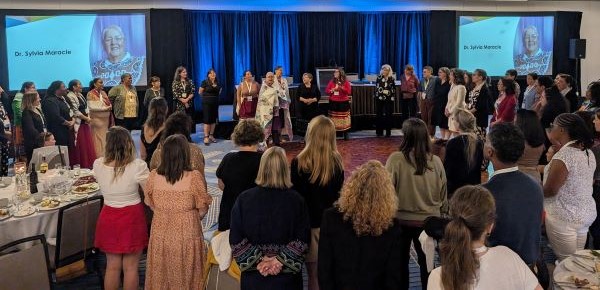
June 5, 2024
“We cannot leave one midwife behind”
– Carol Couchie, IM, NCIM leader, and Indigenous Midwifery Policy Analyst at the AOM
Over 200 midwives gathered from across the province last week for the Head Midwives Forum, OMC 2024 and the Midwifery Sustainability Roundtable to discuss, collaborate and envision a path forward for the midwifery profession. Throughout the three days, workshops, panel discussions, lightning rounds, case studies and focus groups were grounded in the theme Midwifery Futures: Building foundations of health care equity and reconciliation.
Head Midwives Forum
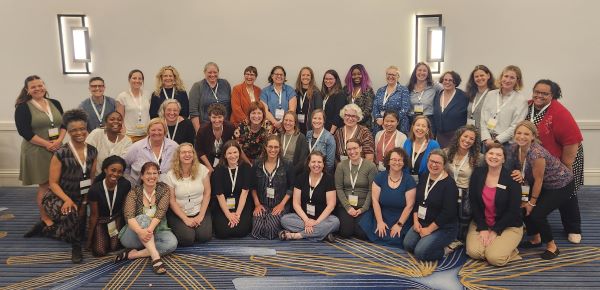
The Head Midwives Forum gathered midwives in hospital leadership roles to examine and share resources, dialogue and strategize together. Head midwives tapped into collective knowledge to navigate and bolster hospital integration, clarify midwifery identity within institutions and elevate midwifery in leadership positions in the health-care system. Participants identified barriers to effective participation, as well as resources and strategies for success. Highlights of programming included a panel discussion examining forging a pathway for Indigenous midwives towards hospital integration, a Midwifery Sustainability Project focus group on the enablers and barriers to midwifery sustainability through hospital integration and leadership, and an interactive session on shaping the head midwife role.
Ontario Midwifery Conference
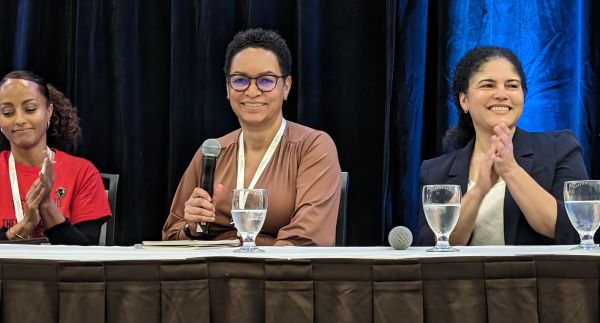
The conference was opened by Elder Vera Pawis-Tabobondung from Wasauksing First Nation, who led a traditional opening to set the tone for a day of sharing and visioning. Midwives began the morning with a collective past-present-future half-day workshop, facilitated by Sara Wolfe, RM RN MBA ICD.D. Sara shared models of future design, rooted in Indigenous frameworks, that centre meaning-making, equity and an intentional problem-solving and decision-making process to achieve sustainable models of care.
Throughout the afternoon, midwives heard from colleagues about existing innovations, collaborations and expanded access across midwifery services in Ontario. Presenters shared lived experiences of working in alternate models of care; ongoing research to support broader access to midwifery care, and flexibility in the way midwives work. Midwives explored themes of equity and belonging by presenting research and lived experiences outlining the negative mental health impacts of racism on racialized midwives in Ontario and the critical importance of ensuring research is designed, implemented and analyzed with the equity-deserving communities it serves at the forefront.
The conference day concluded with the engaging panel discussion, Empowering Black Health: Navigating disparities, celebrating excellence and envisioning futures. ’Remi Ejiwunmi, RM, and Dr. Cynthia Maxwell shared current advocacy work for improvement in fetal-maternal health care for Black clients, strategies to recruit and retain Black and racialized health-care providers and opportunities to cultivate leadership within the health-care system to promote Black excellence. Ejiwunmi and Dr. Maxwell effectively emphasized that the time for better outcomes in the Black community is now, and that effective data collection can decrease disparities for Black birthing people in Canada and foster better outcomes. They stressed that improving health equity for Black and other equity-deserving communities is a shared responsibility that benefits everyone.
Awards Gala and Dance
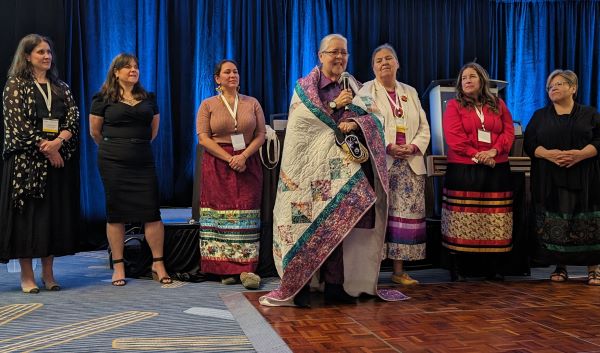
In the evening, midwives gathered to celebrate and honour colleagues, supporters and notable figures within midwifery – “our ‘shift disturbers’” as referred to by Sara Wolfe.
Dr. Sylvia Maracle, Skonaganleh:ra, a 2-Spirit Mohawk member of the Wolf Clan from Tyendinaga Mohawk Territory, was recognized for their incredible lifetime of work championing Indigenous health and wellness strategies. Grounded in the sovereignty of First Nations, Inuit and Metis people, Dr. Maracle laid the foundation for the exemption clause within the Midwifery Act for traditionally trained Indigenous midwives. Dr. Maracle was granted an honorary AOM membership and was celebrated with the gift of a quilted blanket, crafted by Diane Simon, Mi’kmaw midwife and AOM Indigenous Midwifery Policy Analyst.
Midwives acknowledged and thanked outgoing Board member Dione Amsterdam, RM, for their service and outgoing President Jasmin Tecson, RM, who championed midwifery through unprecedented times of crisis and transition.
Other distinguished award winners included:
- Hospital Integration Award – Ross Memorial Hospital
- Media Award – “Should midwives be allowed to do more in Ontario?” Steve Paikin, TVO
- Elsie Cressman Award – Women’s Health in Women’s Hands, Kambili Husbands, RM, Sophia Kehler, RM, and Simone Rosenberg, RM
- Excellence in Midwifery Research Award – Manavi Handa, RM, and Simone Rosenberg, RM, for Ontario midwives' attitudes about abortion and abortion provision
The 2024 Excellence in Midwifery Leadership Award was received by Bridget Lynch, RM. Lynch was a founding member of AOM and CAM and served as the first Canadian president of the International Confederation of Midwives (ICM), supporting initiatives to promote midwifery as integral to health-care systems around the globe.
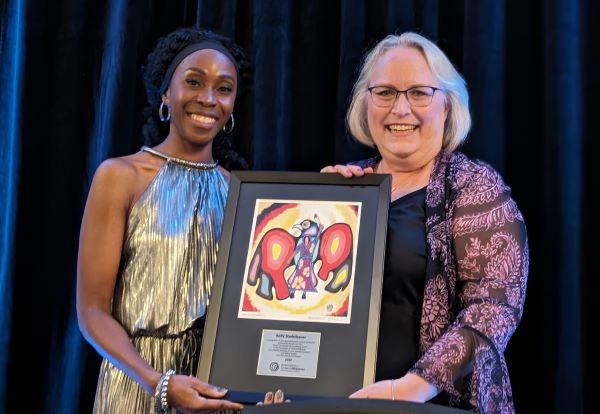
Lastly, Kelly Stadelbauer was honoured by midwives and stakeholders for her dedication and tireless championing of midwifery in her role as Executive Director and Chief Executive Officer of the AOM since 2006. Kelly’s legacy and groundbreaking vision led to systemic and unprecedented gains for the profession. We thank Kelly for her 18 years of leadership, which has forever changed the story of midwifery in Ontario and beyond.
Needless to say, after the awards ceremony… midwives danced!
Midwifery Sustainability Roundtable
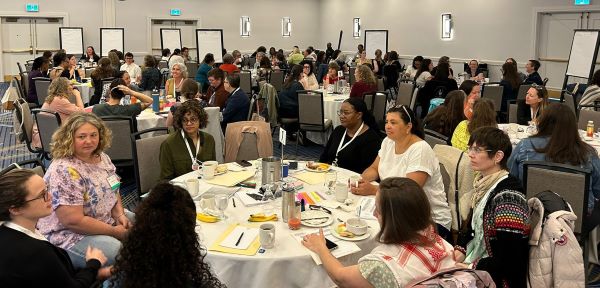
The Midwifery Sustainability Roundtable offered an interactive opportunity for midwives to share ideas, experiences and contributions to shape a healthy and sustainable future for the profession. The day included an overview of the Midwifery Sustainability Project to date, including research of what is known about current factors impacting the sustainability of Midwifery in Ontario. Facilitator Shani Kipang, a leader in collaborative learning, equity and team building, led generative discussions to amplify the voices of midwives and draw out understandings of enablers and barriers to sustainable midwifery practice, culture and integration. The findings from this full-day engagement will inform the future direction for the Midwifery Sustainability Project and the AOM’s advocacy for systemic changes.
“We cannot leave one midwife behind” – this was the impassioned plea from Carol Couchie, Indigenous Midwife, NCIM leader and Policy Analyst at the AOM, reflecting on the imperative nature of the role of the midwife in healthy communities and health-care systems. "The lessons we have learned from reestablishing Indigenous midwifery is that we cannot lose one midwife. We cannot leave one midwife behind. We are one retirement, one leave, one burnout away from the entire program collapsing. We need to support midwives in different capacities.”
Throughout the three engaging and jam-packed days, Ontario’s midwives spoke about the desire to creatively and flexibly move forward together towards healthy, sustainable and innovative futures. Midwives continue to seek new ways of working and advocating for our communities while protecting “the secret sauce” that defines the very essence of midwifery. Our visioning and collective efforts must ensure that not one midwife is left behind.
